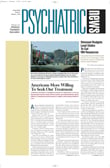By now most APA members know that, in the closing hours of the first session of the 107th Congress, we came within two votes of a stunning victory in the long struggle to enact a meaningful federal mental health parity law for patients. The parity struggle offers important lobbying lessons that I want to share with you so we can work together even more effectively.
Last December, 18 House and Senate conferees on the Fiscal Year 2002 appropriations bill for Labor and Health and Human Services (HHS) met in a packed hearing room in the U.S. Capitol for an impassioned debate on mental health parity. With staff from APA’s Division of Government Relations (DGR) and members of the APA-spearheaded allied Coalition for Fairness in Mental Illness Coverage in the room and lobbying until the last minute, conferee after conferee rose to speak in favor of the Domenici-Wellstone mental health parity amendment that was passed overwhelmingly by the Senate in October.
Unfortunately, when the vote came down to the wire, the House conferees—under intense pressure from the House GOP leadership—rejected the Senate amendment (Psychiatric News, January 18). The vote was 7 ayes to 10 nays, along strict party lines. Conferees subsequently approved a one-year extension of the limited 1996 Mental Health Parity Act. Most significantly, all our lobbying was not in vain. Rep. Ralph Regula (R-Ohio), chair of the House Labor-HHS Appropriations Subcommittee and the key House conference leader, having heard loudly and clearly from his grass-roots psychiatrists and working with us, issued a strongly worded statement included in the final conference agreement that the “conferees recognize the devastating impact of mental illnesses on Americans from every walk of life and the widespread bipartisan support of mental health parity legislation in both houses of Congress. The conferees strongly urge the committees of jurisdiction in the House and the Senate to convene early hearings and undertake swift consideration of legislation to extend and improve mental health parity protections during the second session of the 107th Congress.”
Far From Failure
While it is frustrating to come so close, this was by no means a failure. Instead, we should focus on the tremendous progress we have achieved together in securing our ultimate objective of ending discrimination between health insurance coverage for psychiatric illness as contrasted to other medical illness. Here are just a few of the highlights of the successes we achieved jointly in 2001 with the extraordinary support and involvement of our local grass-roots APA members:
• 66 senators—two thirds of the Senate—sponsored the landmark Domenici-Wellstone parity bill, known as the Mental Health Equitable Treatment Act (S 543).
• 21 members of the Senate Health, Education, Labor, and Pensions Committee voted to approve S 543; not a single senator voted no.
• 66 senators sponsored the Domenici-Wellstone parity amendment that passed the Senate.
• Only a single senator spoke in opposition to the measure, which passed by overwhelming voice vote.
• 200 representatives sponsored the broader House parity bill, the Mental Health and Substance Abuse Parity Act (HR 162).
• 224 representatives—a majority of the House—signed a bipartisan letter supporting the Domenici-Wellstone amendment.
• All told, nearly 250 individual representatives expressed strong support for parity.
• An unprecedented number of editorials, op/ed pieces, letters, columns, and commentaries supporting parity appeared in newspapers across the country, including the New York Times, Philadelphia Inquirer, Newsday, Business Week, and Boston Globe, to name just a few.
• The strong report language increases pressure on House authorizers to take action on parity or else face another parity amendment in the 2003 spending bill.
• President Bush has pledged to work with Sen. Domenici on parity in 2002.
We can take tremendous satisfaction in the fact that our APA core message—that the case for parity is clear and compelling on the grounds of basic civil rights, scientific merit, and long-term cost savings—has been heard and largely accepted by public decision makers and opinion leaders.
Opposition to parity has essentially been reduced to two groups: the Church of Scientology (and those with similar antipsychiatric views), and big-business coalitions that generically oppose mandates. Even among business groups, opposition to parity relates more to perceived cost shifting than it does to disputes about the need for or efficacy of psychiatric treatment. It would, however, be a serious mistake to underestimate the cost concerns of business groups. These concerns are now being exploited by insurance industry associations who seek to deflect responsibility for the recent surge in health insurance premiums by blaming mandates—including mental health parity—and so-called “patients’ rights” legislation.
The Challenge Ahead
What is our strategy for 2002? First and foremost, we must redouble our efforts to secure broad support in key House committees: Education and the Workforce, Ways and Means, and Energy and Commerce. We have already made a very good beginning, and your DGR staff has initiated meetings with key committee staff to explore the possibility of consensus in the House. Together, the grass roots and your staff will press for early hearings and legislative action.
Second, we must be prepared to respond to concerns about cost of coverage and the scope and efficacy of treatment. While we have certainly made the case for parity on ethical, scientific, and cost-benefit bases, the political reality is that House leaders are under heavy pressure from some sectors of their own constituencies to oppose parity in the context of double-digit health insurance cost increases and rising unemployment.
Third, we must build on the extraordinary grass-roots strategy that helped us move so far this year. Our dedication must be absolute, and the pressure—at the national and local levels—on recalcitrant representatives must be relentless.
Finally, we must redouble our work with local opinion leaders—reporters, editorial writers, local business groups, and local legislators—to make the case loud and clear to House leaders: support meaningful parity legislation NOW.
The main lesson of our struggle for parity is that success requires a coordinated, sustained national campaign that utilizes not only the national staff of mental health and patient groups and relentlessly engages the media, but also relies heavily on the active efforts of local grass-roots constituents. Again and again your DGR staff was told by Capitol Hill staff that they were hearing in unprecedented numbers from local constituents, prominent among them local psychiatrists with a clear message of support for parity, and that the local message was vitally important to their decision to support parity legislation in the Senate and House.
Bluntly, the struggle for parity literally cannot be won without your personal dedication. We are on the verge of a tremendous victory for our patients and our members. We at APA are deeply grateful for your outstanding efforts throughout 2001, and we look forward to working with you again in 2002 as we move ever closer to our ultimate goal of ending discrimination against our patients. ▪

